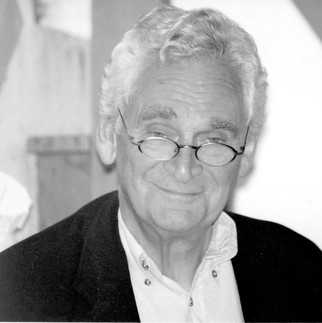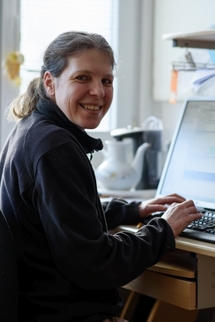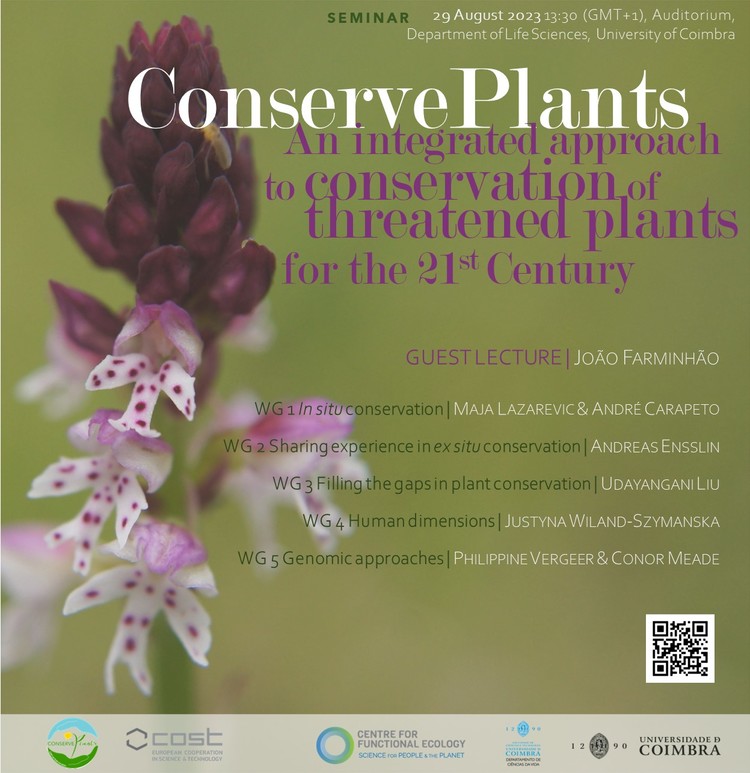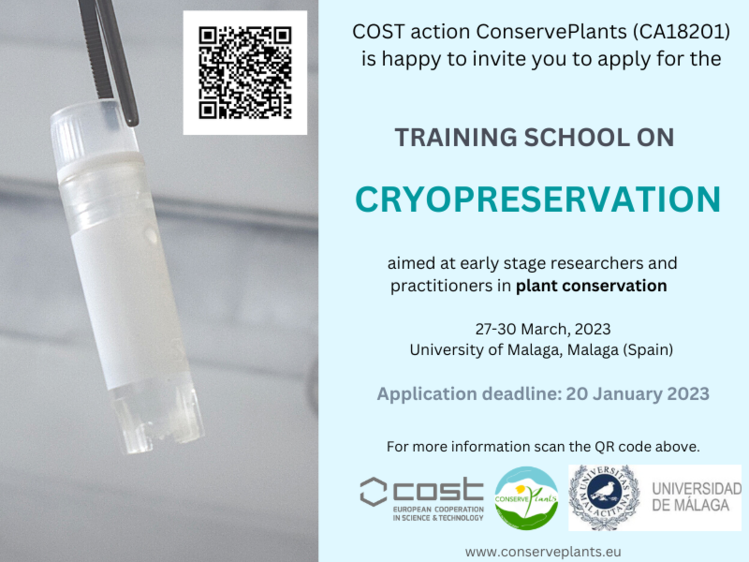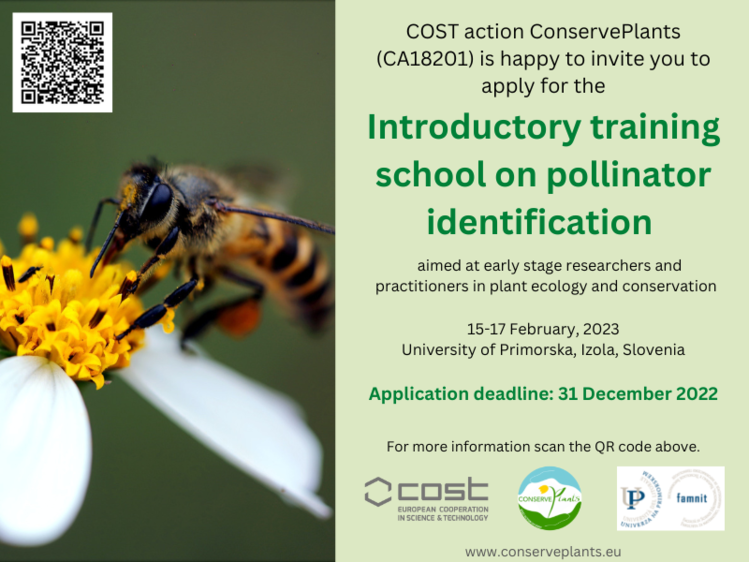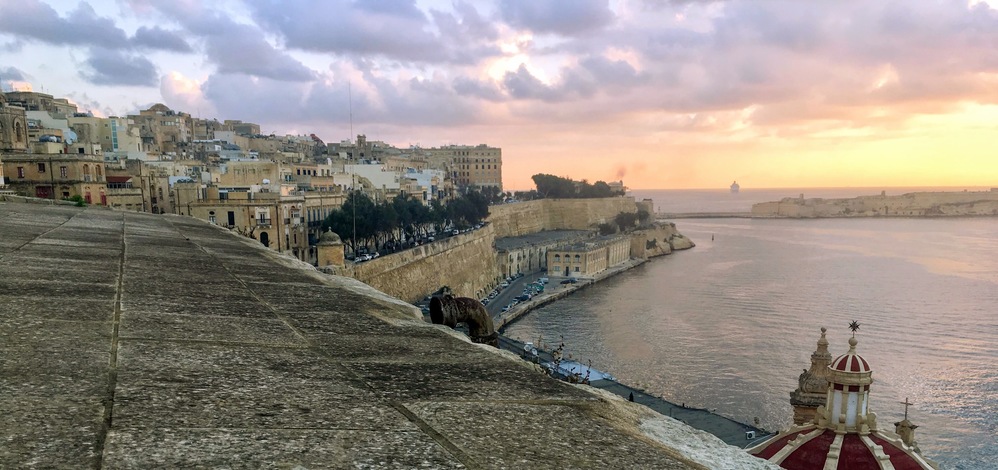EVENTS
printSeveral CoservePlants members attended the XX IBC in Madrid
This year marks a jubilee for the botanical world: the 20th International Botanical Congress, the largest gathering of botanists worldwide! This year's congress was hosted in Madrid, Spain, with over 3000 participants, presenting around 1000 posters and 2000 oral presentations.
Several ConservePlant members attended the congress and presented their work related to the Action. This enabled us to meet again and discuss our past and present work. Despite the hight temperatures that reached 40 ºC, was a week to remember! I hope we will meet again on the next congress in South Africa!






Successful Final Conference
Video of the conference
See what we have achieved
Announcement: ConservePlants Final Conference - February 12-13, 2024
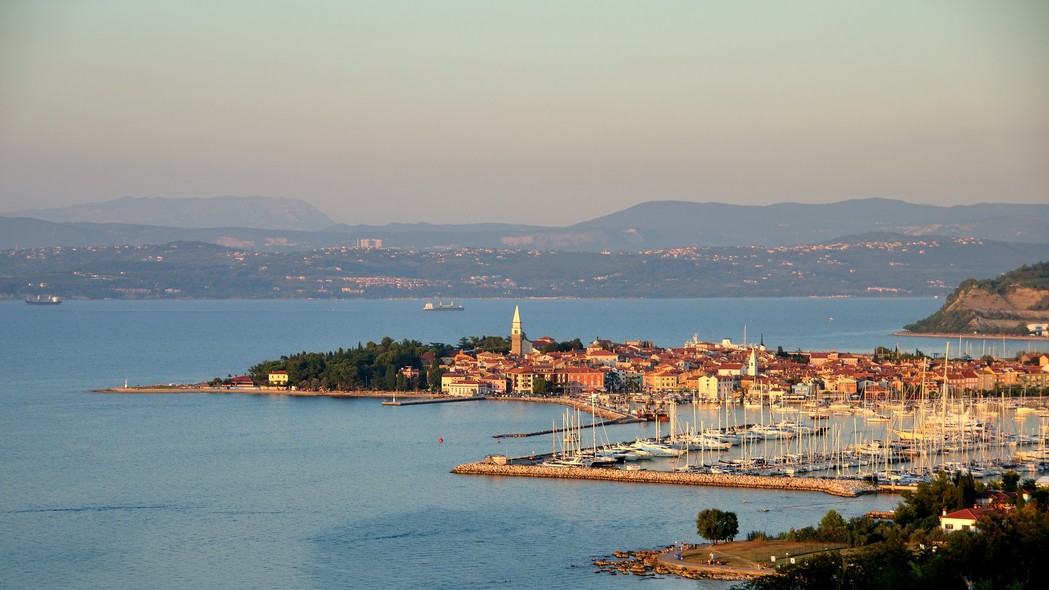
Foto: Domen Jakus
We are delighted to announce the final conference of ConservePlants, scheduled to be held in the picturesque coastal town of Izola, Slovenia, from the 12th to the 13th of February 2024. This culminating event aims to showcase the remarkable achievements and activities accomplished within the COST Action ConservePlants. We cordially invite all members of ConservePlants, as well as individuals and organisations who share our common goal of conserving endangered plants, to actively participate in this significant gathering.
Conference Highlights:
-
Presentation Formats: The conference will feature both oral and poster presentations, offering diverse opportunities for participants to share their insights and findings related to plant conservation.
-
Abstract Submission: We encourage all interested parties to submit abstracts that align with the theme of conserving endangered plants. The deadline for abstract submissions is the 20th of November 2023. Abstracts should be submitted through this form: https://forms.gle/Szyoh53Uz2mZRuk17
-
Financial Support: Selected participants will be eligible for partial reimbursement of daily allowances (160 eur/day) and reimbursement of long-distance* traveling costs, up to 540 euros. These reimbursements will be provided in accordance with COST rules and subject to the available budget. However, it should be noted that if participants can within a reasonable time before travel show that there is no reasonable transport below this amount, this cap may be waved for the individual participant. The limit of 1500 EUR nevertheless still applies. Should you have any questions about the reimbursement rules, please check the Annotated rules (https://www.cost.eu/uploads/2023/11/COST-094-21-Annotated-Rules-for-COST-Actions-Level-C-V1.4-Final-.pdf) or contact our COST administrator Amy Simmons (amy.simmons@iam.upr.si).
-
*Please note! Long-distance travel is any travel equal to or above 101 km one way between the main transportation hub at the point of departure and the main transportation hub at the event venue and return. See special provisions for transport by car in the Travel Reimbursement Rules. Transport to and from a main transportation hub (meaning an airport, harbour, main train or bus station) is covered by the daily allowance if the distance is less or equal to 100 km one way.
We look forward to an enriching and collaborative conference that will allow us to share insights, discuss progress, and forge new partnerships in the mission to preserve endangered plant species.
Guidelines for oral and poster presentations
Speakers are expected to respect the time limit of 15 min. Power point presentation must be deposited to the organisers at registration on the first day of the conference (12th February).
Posters should be printed in the A0 Format (Width – horizontal: 90 cm and Length – vertical: 120 cm) or smaller. In case the presenter would like to use the landscape format, the maximum width is 90 cm. Presenters of posters are highly encouraged to prepare a 3-5 min video presentation of their research. This videos will be played during the breaks at the conference and will be uploaded on the ConservePlants webpage and on social media. Videos should be uploaded here (include your name in the file name) before 6th Feburary. For any issues please contact our COST administrator Amy Simmons (amy.simmons@iam.upr.si).
Venue
Kampus Livade 1.0, Livade 6, 6310 Izola, Slovenia
Conference Programme
Poster presentations
Book of abstracts
SIDE EVENT: MEET THE AUTHORS OF THE CHILDREN'S BOOKS: Monday 12 February 2024 at 16.30-17.30. Event will be moderated by Baiba Pruse.
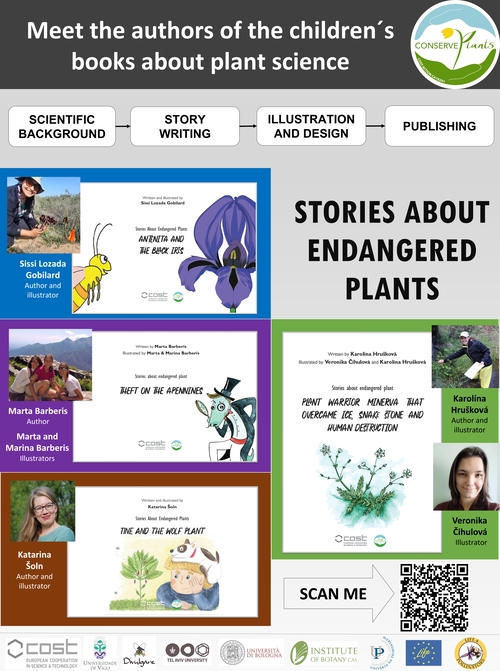
Social Dinner
On the first day of the conference, Monday, 12.2., we are organizing a dinner at restaurant Kamin in hotel Belvedere in Izola, at the address Dobrava 1a. The dinner starts at 19h, please make sure to arrive a few minutes before. Due to COST rules, participants will have to cover the dinner costs on their own (you will be paying at the restaurant yourself, with cash or card). The price of the dinner is 52 EUR, which includes a 4-course menu and two drinks. If you are traveling with family members who would like to attend the dinner, they are very welcome to join us. Please mention this at the end of the form. You will be expected to cover any other expenses you make at the dinner (e.g. additional drinks). More information on transportation to the restaurant can be found on the ConservePlants website.
If you wish to attend the dinner, please register on this link and choose your preferred menu. The deadline to register is Wednesday, 31st of January.
Means of transportation to the restaurant:
a) By bus from the center of Izola. The bus ticket inside Izola is around 1 EUR, pay in cash only. Your final destination is the bus stop Izola Dobrava, from which you walk a few minutes to restaurant Kamin, hotel Belvedere. Not all buses that come to the Izola bus station drive to the Izola Dobrava station, so make sure to check the bus schedule (on this link: https://arriva.si/vozni-redi/ or directly on the google maps app). Your bus is blue, company name written on the bus is Arriva. Also, feel free to ask people around you at the bus stop, if you need additional guidance.
b) Taxi (try Taxi Ian Obala 041 513 122, Taksi Fikret Bajramović 040 602 602, Taxi Alen Božič 041 706 777 or google other taxi services)
c) Walking - it is a cca. 40 minute walk uphill, depending on your speed, but it is a nice scenic walk.
d) Local organisers and some participants will probably have a car, so it will be possible for some participants to join them. We will circulate this information during the day.
Accommodations and travel
Hotels in Izola:
Special conference offers:
Hotel Haliaetum: Morova ulica 6a, 6310 Izola
Hotel Halietum 4* has 45 rooms available from 10.-14.02.2024. Prices are a) 98 €/room/night in a two-bed room with breakfast and b) 78 € / room/night in a one-bed room with breakfast. Additionally, visitors pay the tourist tax 2,50 €/person/night and fee (prijavnina) 1,00 €/ person/night. To book, use this link or write an email to booking@sava.si specifying you are booking for ''COST Action ConservePlants conference in Izola, February 12th-13th''.
Hotel Keltika: Cesta v Jagodje 1, 6310 Izola.
Hotel Keltika 3* has 13 rooms available at the moment. On their standard prices they have 10% discount for a 2-night reservation, 15% discount for 3 night reservation and 20% discount for 4 or more nights reservation. To book, email info@keltika.si, indicating you are booking for COST Action ConservePlants conference in Izola, February 12th-13th.
Other hotels in Izola
DeGrassi Boutique Garni Hotel: Drevored 1.maja 9, 6310 Izola
San Simon Resort: Izola (multiple locations)
Hotel Belvedere (Cliff and Villa): Dobrava 1a, 6310 Izola
Airports:
Trieste Airport (TRS), 55-minute drive from Izola
Ljubljana Airport (LJU), 1 hour 20-minute drive from Izola
Venice Marco Polo Airport (VCE), 2-hour drive from Izola
Treviso Airport (TSF), 2-hour drive from Izola
Zagreb Airport (ZAG), 2 hour 30-minute drive from Izola
Shuttle service from airports/train stations:
The easiest way to travel to Izola from the airports above is to take a shuttle service like GoOpti transport. Reservation for transfer can be made directly to your hotel. Prices are lower if the shuttle is booked well in advance (1 month).
Bus or train:
You can travel by train from most European countries via connection to Koper (Slovenia), Trieste (Italy) or Ljubljana (Slovenia). From these locations, you need a bus transfer or other transport to reach Izola.
From Ljubljana Airport (“Brnik/airport Ljubljana”), transportation by bus is possible by first taking the bus to the center of Ljubljana (“Ljubljana AP”) and then taking the bus to Izola.
From Trieste airport, you can travel to the center of Trieste by train or bus, and from there take another bus to Izola.
Travel by bus to Izola is possible. Once in Izola, public transportation is available to move around the city.
Other useful information
Currency: The Slovenian currency is the Euro.
Language: In addition to Slovenian, most people in Slovenia speak English. On the coast, most people speak Italian as well.
Important phone numbers
- 112 Emergency call center – emergency medical assistance, fire-fighters, veterinary assistance, rescue units
- 113 Police – emergencies
- 080 12 00 Police – reporting offenders, anonymous phone line
- 1987 AMZS – roadside assistance and towing
- 080 1900 - Tourist telephone – tourists and tourism workers can report their comments, complaints, criticism and suggestions to this toll-free number 24 hours a day
- 1188 - Information on telephone subscribers in Slovenia
- 1180 - Information on international telephone subscribers
- 198 10 - Alarm call service
- 090 93 9881 - General information (pay number)
- Telephone area code for Slovenia +386
- Code for international calls: 00
Tourist information: Visit I Feel Slovenia for information about tourist attractions in Slovenia. We recommend visits to Škocjan Caves, Postojna Cave Park, Sečovlje Salina and Piran.
ConservePlants Final MC meeting - on line
Last MC meeting of the ConservePlants COST Action will be held on-line on 22 January 2024 at the following zoom link: https://upr-si.zoom.us/j/8115662408?pwd=S0lQSnVLbzBXUTNITG12Z3ZpWFBPdz09&omn=82506103335
Minutes of the MC meeting are available here.
ConservePlants MC & WG meeting in Coimbra, Portugal - 18-30th August 2023
The next MC and Working Groups meeting of ConservePlants will occur next week, in the beautiful city of Coimbra from the 28th to the 31st of August!
Within the Working Groups activities, an open-to-the-public hybrid seminar will occur on the 29th of August in the Department of Life Sciences of the University of Coimbra.
The seminar will count with presentations by several members of the COST Action, engaged in disseminating the knowledge produced regarding plant conservation.
The seminar is free, but registration is mandatory in the following link, or using the QR code in the image:
Workshop on Engaging Citizen Scientists in plant conservation
A very successful workshop on BioBlitzes, Citizen Science and Local Ecological Knowledge was held on 19 May 2023 in the Škocjan Caves Regional Park in Slovenia. The workshop organiser, Baiba Pruse, who is also co-chair of ConservePlants WG4, did a great job gathering speakers from Italy, Cyprus, Spain, Germany, the UK and Slovenia! After the workshop, Marta Galloni presented her experience of organising BioBlitzes as part of the LIFE 4 Pollinators project. The workshop was addressed to protected area managers from Slovenia, Croatia and Italy.
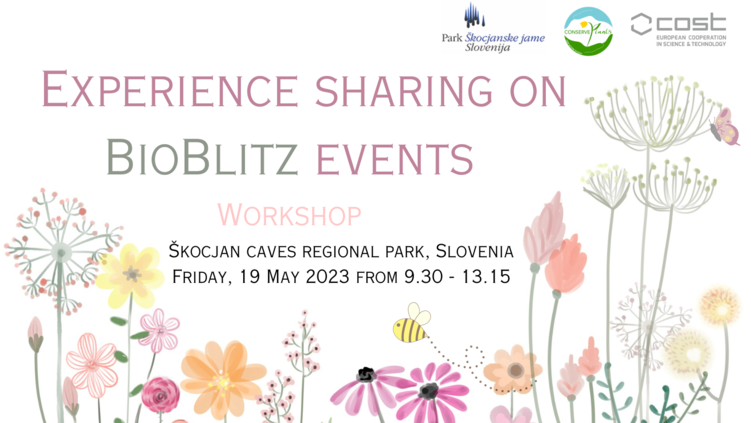
ConservePlants training schools in 2023
As many as three training school have been organised in spring 2023! For more details and training materials, please check the tab Training Schools & Workshops!
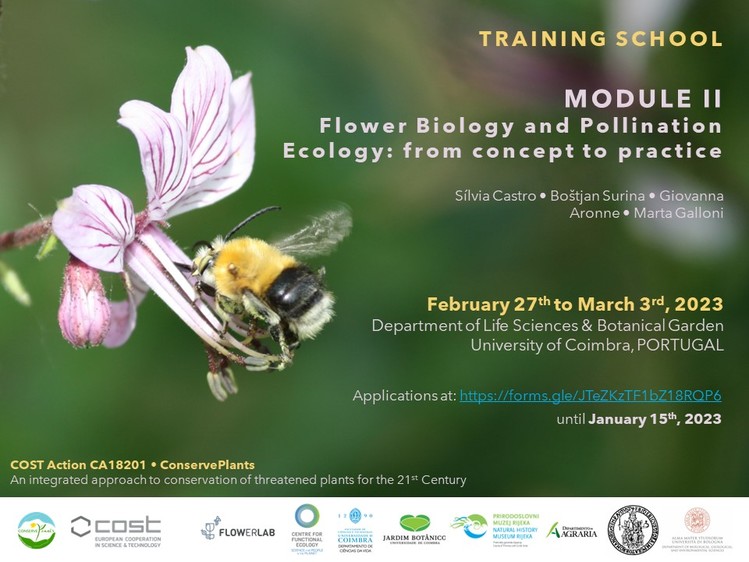
ConservePlants MC & WG meeting in Valletta - 13-16th September 2022
ConservePlants is excited to inform you that the 5th MC meeting and associated WG meetings will be organised in Valletta, Malta. Below are some travel information.
PRELIMINARY AGENDA
| 13.9.2022 | 09.00 - 12.00 | Management Committee meeting |
| 13.30 - 16.30 | WG2 Meeting | |
| 14.9.2022 | 09.00 - 12.00 | WG5 Meeting |
| 13.30 - 16.30 | WG3 Meeting | |
| 15.9.2022 | 09.00 - 12.00 | WG4 Meeting |
| 13.30 - 16.30 | WG1 Meeting | |
| 16.9.2022 | 09.00 - 13.00 | Field excursion |
| 13.30 - 16.30 | Core Group Meeting (for CG members only) |
ARRIVING IN MALTA
Malta International Airport (MIA) is connected with the major European Airports and operates flights by numerous airlines, including low-cost ones. Details of services offered and flight schedules may be consulted via the official website https://maltairport.com/ Any Covid-19 related information and restrictions is updates on the dedicated webpage https://maltairport.com/covid19/
Malta also has its own airline, AirMalta. Flights and services can be access and booked via the official website https://airmalta.com/en-mt .
Malta is also connect with Sicily through a ferry service provided by two different suppliers. More information on prices and trip duration on the respective websites:
Ponte Ferries: https://ponteferries.com/tickets-pricing/
Virtu Ferries: https://www.virtuferries.com/
MOVING AROUND IN MALTA
Transfers from Malta International Airport (MIA) to Hotels:
Public Transport
Public transport is available from MIA via X routes starting at c. 05:30hrs with last trip at c. 22:30hrs. Updated information regarding timings and routes can be accessed via the following link: https://www.publictransport.com.mt/en/airport-services
Taxi Service
Taxi stands are also found at the airport. Fixed rates per destination apply. More information is available from the following link: https://maltairport.com/passenger/getting-here/taxi-service/
Moving around in Malta and Gozo:
Public Transport
It is very easy to reach practically all areas in Malta by using the public transport buses. Routes and timings may be accessed via: https://www.publictransport.com.mt/
Tickets can be purchased from the bus driver on all buses. These Cash Tickets are Single Journey tickets that can be used to get to any destination within two hours, including interchanging. Rates vary between Summer and Winter months. Summer rate is €2 and apply between mid-June and mid-October. Winter rate is €1.50. Night service is €3. You can also opt for tallinja cards. These are a range of bus cards offering added value and reduced fares to suit your needs, depending on your traveling patterns, such as 7-day “explore” and 12-journey “explore” travel cards. These can be bought from the ticket office at the airport, or from the bus main station in Valletta.
Same service is also available on sister island Gozo.
Taxi and Car Hire
There are a number of taxi and car hire companies in Malta and Gozo. Below find suggestions:
|
ECABS Tel: (+356) 2138 3838 Web: http://ecabs.com.mt/ |
Percius Car Hire Tel: (+356) 2144 2530 Web: http://www.percius.com/ |
Ferry Service
A ferry service connects Malta and sister island Gozo. The journey lasts c. 20 minutes. Ferries leave from Cirkewwa in Malta and Mgarr Harbour in Gozo. More info on schedules and fares can be obtained via: http://www.gozochannel.com/en/home.htm
Recently a ferry service from Valletta to Gozo has also been introduced, operated by two different companies. More information on fares and schedules, including weather conditions, can be accessed on the official websites of each respective company:
Gozo Fast Ferry - https://gozofastferry.com/
Virtu Ferries Gozo - https://virtugozo.com/pages/fares-and-schedule
A ferry service also operates from Valletta to Sliema and to the Three Cities. Apart from being a pleasant way to travel from one side to the other of the harbour, it is also often quicker than land transport, especially during rush hours. Timetables and ticket prices may be found on: https://vallettaferryservices.com/
Recommended hotels for the Malta conference
Given that the conference venue is in Valletta, the most straightforward choices for accommodation would be in Valletta itself. However, other localities such as Sliema, St Julian’s and Gzira are also very well-connected to Valletta. The public bus service schedules several trips from Sliema and St Julian’s to Valleta and many of these drive through Gzira and Msida. Moreover, Valletta is also connected to Sliema through a ferry service that is reasonably frequent. A single Sliema-Valletta trip usually takes less than ten minutes by ferry and may be much longer on a bus, depending on traffic. You can find accommodation on popular online agencies such as Booking.com
The Conferences and Events Unit of the University of Malta recommends the following hotels. When placing their booking, participants would need to use COST Conserve Plants Meeting/University of Malta as a reference.
Luciano Valletta Boutique Accommodation (within walking distance from meeting venue)
Merchants Street, Valletta
Email : info@vallettaboutique.com
Double indoor room, no street view, window overlooking internal courtyard @ 80E per night on bed & breakfast basis
Double room with street view @ 140E per night on bed & breakfast basis
Luciano Al Porto Boutique Accommodation (within walking distance from meeting venue)
St Ursula Street, Valletta
Email : info@vallettaboutique.com
Double room with Grand Harbour view @ 170E per night on bed & breakfast basis
Double room with street view @ 140E per night on bed & breakfast basis
Osborne Hotel - 3* (within walking distance from meeting venue)
South Street, Valletta
Email : brian@osbornehotel.com
Standard room for sole use @ 120E per night on bed & breakfast basis
Standard room for double use @ 140E per night on bed & breakfast basis
Holiday Inn Express - 3*
St George's Bay, St Julians
Email : marika.smith@ihg.com
Standard room for sole use @ 140E per night on bed & breakfast basis
Kennedy Nova Hotel - 4*
116 The Strand, Gzira
Email : sales@kennedynova.com
Single room @ 100E per night on bed & breakfast basis
Double room @ 117E per night on bed & breakfast basis
Embassy Hotel - 4* (within walking distance from meeting venue)
Strait Street, Valletta
Email : sales@embassy.com.mt
Standard room @ 200E per night on bed & breakfast basis
Waterfront Hotel - 4*
Triq ix-Xatt, Sliema
Email: cnaudi@water.mizzi.com.mt
Single room @ 155E per night on bed & breakfast basis
Double room @ 165E per night on bed & breakfast basis
The Victoria Hotel - 4*
Gorg Borg Olivier Street, Sliema
Email : sylvain.azzopardi@axhotelsmalta.com
Single room @ 125E per night on bed & breakfast basis
Double room @ 140E per night on bed & breakfast basis
The Saint John Hotel - 4* (within walking distance from the meeting venue)
Merchants Street, Valletta
Email : sylvain.azzopardi@axhotelsmalta.com
Single room @ 175E per night on bed & breakfast basis
Double room @ 195E per night on bed & breakfast basis
Urban Valley Resort - 4*
Triq Wied Ghollieqa, San Gwann
Email : events@urbanvalleyresort.com
Single room @ 109E per night on bed & breakfast basis
Double room @ 122E per night on bed & breakfast basis
The Palace Hotel - 5*
High Street, Sliema
Email : sylvain.azzopardi@axhotelsmalta.com
Single room @ 160E per night on bed & breakfast basis
Double room @ 180E per night on bed & breakfast basis
Corinthia Hotel - 5*
St George's Bay, St Julians
Email : estelle.borg@corinthia.com; luke.sammut@corinthia.com
Superior room for sole use @ 165E per night on bed & breakfast basis
Superior room for double use @ 185E per night on bed & breakfast basis
Radisson Blu Hotel - 5*
St George's Bay, St Julians
Email : estelle.borg@corinthia.com; luke.sammut@corinthia.com
Standard room for sole use @ 155E per night on bed & breakfast basis
Standard room for double use @ 175E per night on bed & breakfast basis
Map of Valletta indicating the conference venue:
Forest Genetic Monitoring Training School Announcement
For on-line attendance please fill in this form: https://forms.gle/CvXwH5p16Eo1ACv99
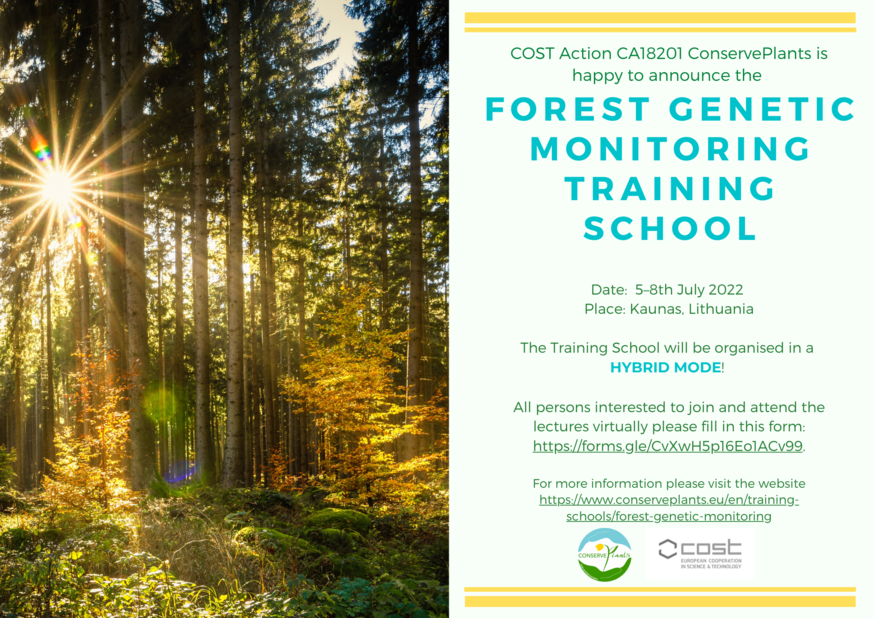
Lectures from the last MC meeting in Bologna, October 2021
Announcement of the Training School IUCN Red List Assessor for Threatened Plants (Podgorica Montenegro, 29.3.-1.4.2022)
More information on the training school and the application procedure can be found here. Application deadline: 10th February 2022.
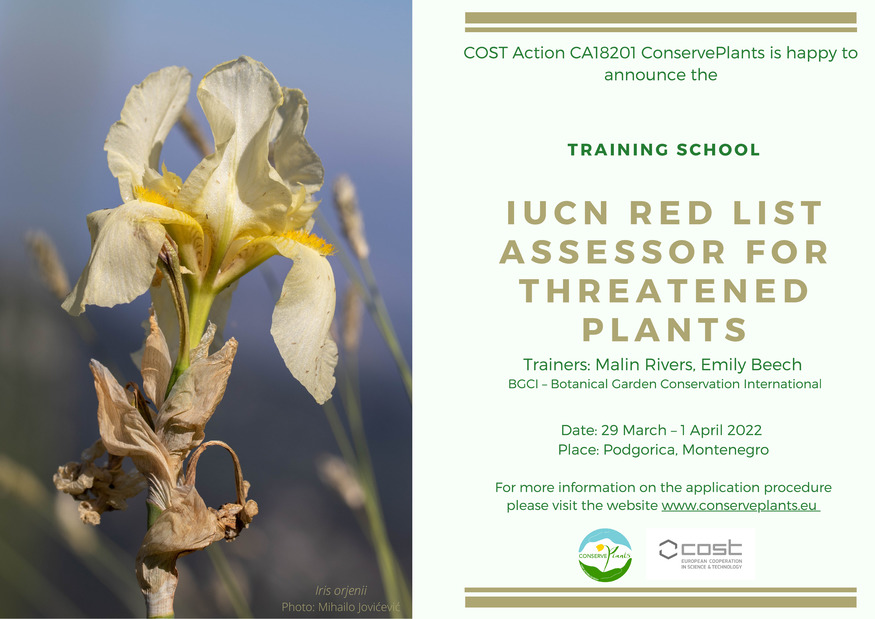
Introducing guest speakers of the meeting in Bologna
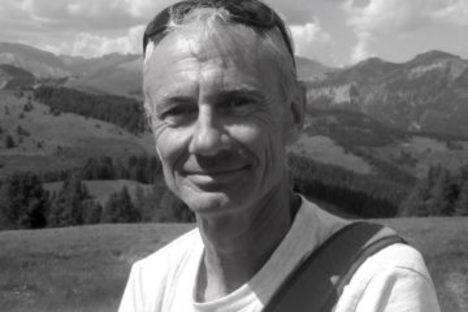
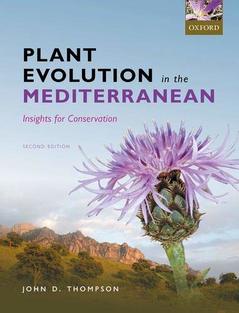
John D. Thompson is a research director with the CNRS at the Centre d'Ecologie Fonctionnelle et Evolutive (CEFE) in Montpellier, France where he works on the ecology, adaptation, and conservation of Mediterranean plant biodiversity. He is President of the scientific commission for the Mercantour National Park, President of the National Parks Scientific Commission for the French National Biodiversity Agency, and member of the scientific commissions of the Mediterranean Botanical Conservancy (France) and the Calanques National Park.
A second edition of his book Plant Evolution in the Mediterranean, first published in 2005, was released in 2020. In his speach, he will talk about the conservation of evolutionary potential in the Mediterranean flora.
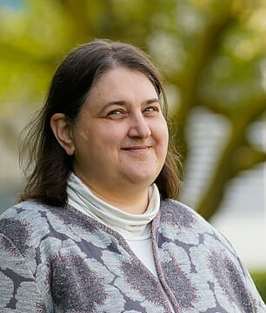
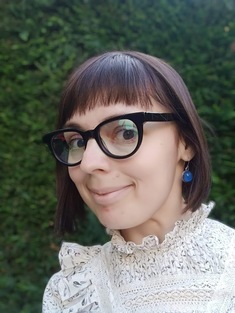
Renata Sõukand is an ethnobotanist with a background in pharmacy and environmental sciences. She is an associate professor at the Department of Environmental Sciences, Informatics and Statistics, Università Ca' Foscari Venezia. Renata does research in Ethnobotany, Cultural Anthropology, Medical Anthropology and History of Science. She is interested in formation of relations between people and plants (and environment in general), from the cultural studies perspective.
Yuliya Prakofjeva is a historian, specializing in Eastern European and Soviet environmental history. Social anthropologist with long-standing field experience in cross-border areas. Currently a doctoral candidate in Environmental Sciences. Her research interests include local ecological knowledge of useful plant diversity for healthcare, food security and subsistence in the Polish-Lithuanian-Belarusian borderland. She continuously expands her expertise on digital environmental communication and social and cultural aspects of human-nature relationships.
Renata and Yuliya with talk about the role of a human in plant conservation, giving examples from the Polish/ Belarus/Lithuanian borderland.
ConservePlants 4th MC meeting in Bologna - 14th & 15th October 2021
ConservePlants is excited to inform you that the 4th MC meeting and associated WG meetings will be organised in the beautiful city of Bologna, Italy.
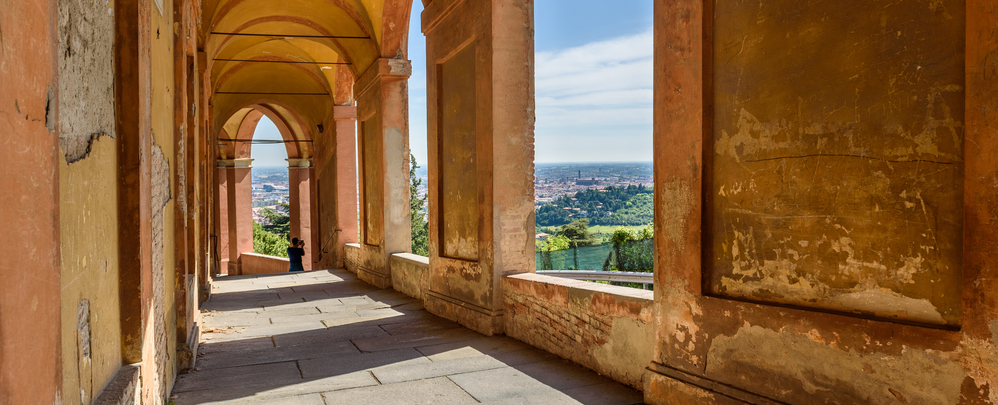
Copyright: © Giorgio Bianchi – Comune di Bologna
Information regarding Covid-19 and the venue can be found here.
Approximate schedule:
Thursday, 14th October 2021
9.00 - 12.00 MC meeting (for MC members / substitutes only)
ZOOM Link to the meeting: https://upr-si.zoom.us/j/8115662408?pwd=S0lQSnVLbzBXUTNITG12Z3ZpWFBPdz09, Meeting ID: 811 566 2408, Passcode: Lpm3z4
12.00 - 14.00 lunch
14.00 - 18.00 Afternoon session: Invited speakers and Working Groups updates
Greetings by the representatives from University of Bologna
14.00 - 15.00 Guest speaker: John Thompson: Towards the conservation of evolutionary potential in the Mediterranean flora
15.00 - 16.00 Guest speakers: Renata Sõukand & Yuliya Prakofyeva: The role of a human in plant conservation: the example from Polish/ Belarus/Lithuanian borderland
16.00 - 18.00 Updates from Working Groups (STSM reporting: Daniele Calabrese, Nina Lončarević, Jinlei Zhu & others, presentation of the CITES booklet)
ZOOM Link to the afternoon session: https://upr-si.zoom.us/j/83063417386?pwd=Vm5yMnNRem01bmIwVnRjQ0xIME9qUT09, Meeting ID: 830 6341 7386, Passcode: 543068
Friday, 15th October 2021
9.00 - 13.00 Working Group 2 hybrid meeting
ZOOM Link to the meeting: https://upr-si.zoom.us/j/88171582509?pwd=Q0ExRDc5UTk1VW9jdHVicGhxQkxvdz09, Meeting ID: 881 7158 2509, Passcode: 649248
9.00 - 13.00 Working Group 3 meeting - face-to-face only
13.00 - 15.00 lunch
15.00 - 18.00 Core Group meeting (for invited Core Group members only)
ZOOM Link to the meeting: https://upr-si.zoom.us/j/8115662408?pwd=S0lQSnVLbzBXUTNITG12Z3ZpWFBPdz09, Meeting ID: 811 566 2408, Passcode: Lpm3z4
Additional information will be sent to the participants prior the beginning of the meeting.
Restoring European grasslands
One of our ConservePlants members, Sandrine Godefroid, leader of Working Group 2, has recently co-authored an interesting paper about the restoration of European grasslands.
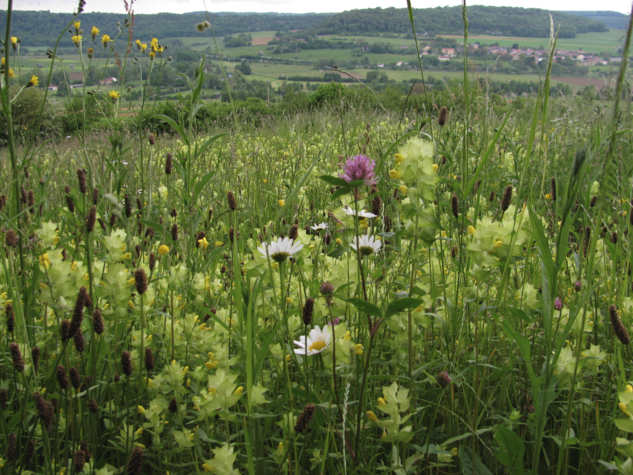
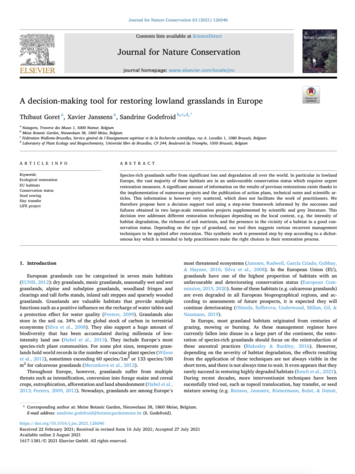
Meise Botanic Garden was involved in an ambitious grassland restoration project funded by the European Union. This project is now complete and we published last week the paper A decision-making tool for restoring lowland grasslands in Europe.
This tool contributes to achieving GSPC target 3. We also believe it is timely in the context of the UN Decade on Ecosystem Restoration (2021-2030) and given the continuous and widespread degradation of these habitats across much of Europe.
In addition to the particularly encouraging results which have been obtained, this project has demonstrated the complementarity and effectiveness of a partnership between the major players in the field of nature restoration and a botanical garden whose main mission is ex situ conservation. If this kind of collaboration was until recently unlikely in the context of LIFE projects, today it represents real added value for nature restoration projects.
The pdf of the article is temporarily accessible on the Elsevier website at the following link: https://authors.elsevier.com/a/1dbez5liTFGKVd
Anyone clicking on this link before October 07, 2021 will be taken directly to the final version of the article on ScienceDirect, which they are welcome to read or download. No sign up, registration or fees are required.
A reflection from the workshop on Plant Food-Medicines Perceptions, Traditional Uses and Health Benefits of Food Botanicals, Mushrooms, and Herbal Teas
Post by Baiba Pruse, Vitalija Povilaityte-Petri, Alex Laird, Wendy Wuyts, Muratk Kızıl, Cristina Flora
In cooperation between the team of DiGe project (ERC-StG-2016) and COST Action ConservePlants an online workshop took place on 24th and 25th of February 2021 with more than 30 participants from more than 10 countries. The two day workshop brought together members from diverse disciplinary backgrounds e.g. anthropology, ethnobotany, pharmaceutical and food sciences, ecology, complementary-alternative medicine and professions e.g. philosophers, food designers, herbalists, entrepreneurs from plant supply and processing companies. Moreover, the representation of countries was mind blowing as the participants were from Argentina, Philippines, Turkey, Iran, Latvia, Estonia, Lithuania, Belgium, Italy, Germany, Denmark, UK, Canada and many more.
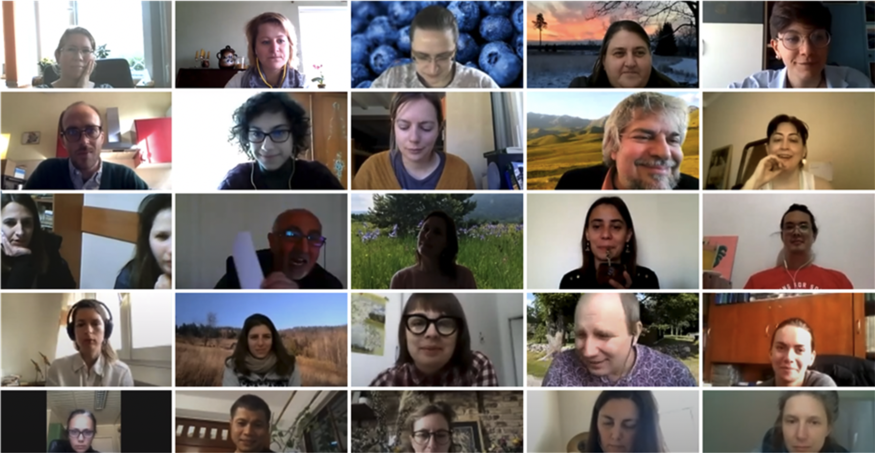
The workshop goal was two fold: to create a networking platform under the topic of plant foods as medicine and to compose a working material for future publications. Throughout the workshop various collective intelligence tools were explored thanks to the training provided to the moderators by Céline Huart from Empathy Tank Baltic.
The first day was about connecting plants and people. Beforehand, all participants were asked to bring a herbal drink and draw their favorite plant. During the session they were asked to introduce themselves in a lean way. Afterwards, Prof. Renata Soukand and Prof. Andrea Pieroni introduced some terminology and main objectives of the field in which they work. While some researchers investigate the biochemical and pharmaceutical properties and evolutions of plant medicines, a smaller group explores the context and the perception that people, communities, countries have. As Prof. Andrea Pieroni said: What makes X (a plant) a medicine for Y (community, culture)? Why does Y ingest X? Why does Y think X (in this dosis, under this condition) is healthy? This understanding can be of high value, for e.g. public health officers, cultural heritage preservationists, other communities in need of self-care knowledge.
During the working process, participants shared their views of healthy food. What does it mean to them? What is their personal story? What are their research interests and needs? Why do they believe this subject is important?
Here comes only some lines from the participants in respect to above:
“Plant based food is the most compatible with my yoga practice. Helps me breathe and flow better.” - Lumberto Mendoza
“The extra-ordinary world of plants and how they interact with us. Life/nature's design and nature is my study, my teacher. Schrödinger said, life is about the inside and the outside. Plants amaze me with their elegant and dynamic responses to their environment, synthesising phytochemicals in their thousands which then support our body's myriad functions. Complexity, diversity and reciprocity underpin our/nature's design. A key to living well is managing boundaries with love and kindness, while recognising our oneness - i.e. Keat's negative capability.” - Alex Laird
“I love plants and every gift they produce for us.” - Nataliya Stryamets
“In Latvia we have a very broad tradition of foraging (berries, mushrooms, herbs for tea). This tradition unifies families and provides opportunity for different generations to connect. I prefer the use of plants as medicine (for relief of common cold, gastric issues, etc.) and have enjoyed plant medicine benefits from early age (chamomile, pine syrup, peppermint etc.).” - Ilona Vanaga
“Barbabuc (Tragopogon porrifolius), a wild edible plant I used to harvest with my grandma. Now that she does not harvest it anymore, I do it for her and she cooks it for me. It is food, but this plant has a lot to do with healing and strengthening relationships.” - Giulia Mattalia
“Why and how people fall in love with plants?” - Vitalija Povilaityte-Petri
“From Idea to Launch a product, there are many issues to consider but the red line is always the same: tradition, respect for nature and the people who are working for knowledge transfer but taste, trends and consumer views are as well important.” - Cynthia Suarez Rizzo
“Plants link us with the wilderness we have inside.” - Nicola Robecchi
“If food has the power to prevent much of the chronic illness we experience today then it makes sense to alter our diets to use it to our own advantage to not only heal and restore the body but also to prevent illness.” - Murat Kızıl
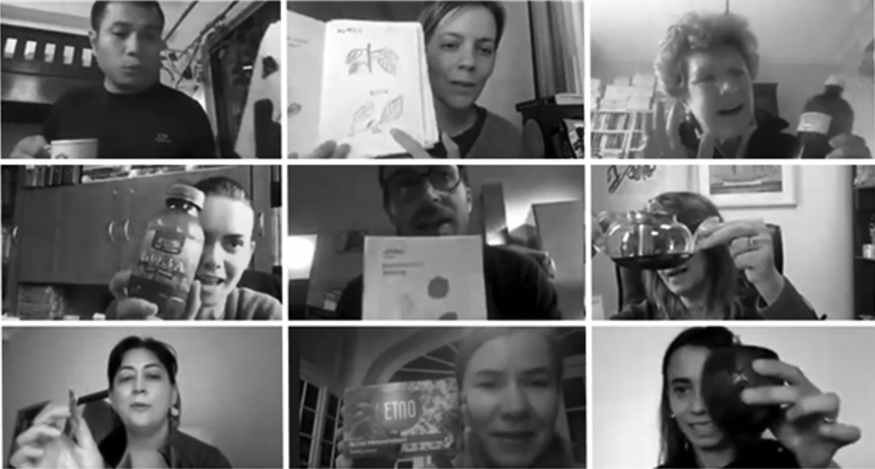
On the second day, six working groups were established with questions linked to defining healthy food through time and space including aspects regarding imagery of healthy food. Each working group received direct feedback from Prof. Renata Sõukand and Prof. Andrea Pieroni and thus ensuring the continuation of sharing various perspectives.
We thank each and everyone for the positive energy and working spirit as the ideas deserve further attention. In case you missed the opportunity to join the workshop but hold a great interest to hear more about the working groups and following working steps, please, send a message to Baiba Pruse (baiba.pruse@unive.it) or Cristina Flora (857854@stud.unive.it).
Training School Plant Translocation – Theory and Techniques
Date: 8-10 September 2021
Place: on-line
Training School leaders: Koenraad Van Meerbeek, Stef Haesen, Peter Glasnovic, Tobias Fremout and Olav Skarpaas
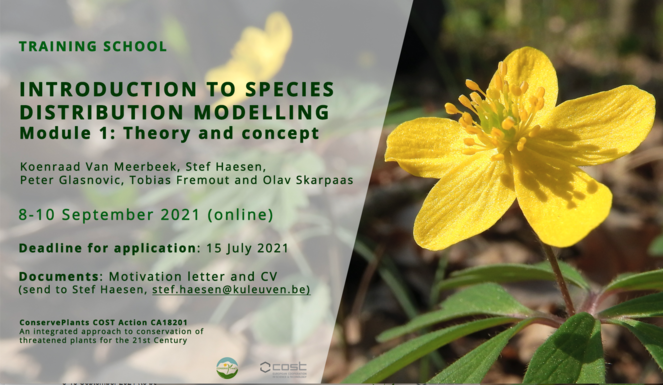
This online training school is prepared within the framework of ConservePlants COST Action (CA18201) and aims at training Early Career Researchers in the fundamental concepts underpinning species distribution models. The aim of online course is to work towards a thorough understanding of SDMs. We will focus on statistical models of species distributions – those that combine observed species records with environmental data. Using a mixture of online lectures, Q&A sessions and case studies, participants will:
- understand the theoretical underpinnings of SDMs, including strengths and limitations;
- get insight in the different steps that are necessary to perform SDM;
- know which data are necessary to perform SDM and where to get it;
- understand the differences between different modelling types;
- learn to evaluate models and interpret them;
- and apply the theory in simple case studies in R.
The applications will use the free statistical software R – basic experience is mandatory. Example data will be provided.
This course is the first of two modules and will focus on theory and concepts. This first module will be held online and is designed for PhD students and Early Career Researchers, interested in using SDMs to model species ranges and predict the impact of climate change. Applicants should send a motivation letter (1p) and Curriculum Vitae to Stef Haesen (stef.haesen@kuleuven.be) before the 15th of July 2021. In the second module (which will be organized later), we will deal with more advanced topics of SDM and we will focus on the practical implementation in R.
Deadline for application (Module I): 15 July 2021
Documents: Motivation letter and CV - send to stef.haesen@kuleuven.be
Baiba Pruse introducing the aspects of Ethnobotany and citizen science
ConservePlants WG4 co-leader Baiba Pruse, Ph.D., introduces the aspects of ethnobotany + citizen science. The short interview added below is part of a training commissioned to the European Citizen Science Association, called “The nuts and bolts of citizen science”. Enjoy the recording!
In the video, Baiba shortly introduces the recent book on citizen science, called “The Science of Citizen Science” and references additional scholars of the field of work. She also names the recent newsletter post on ethnobotany and citizen science published together with Dr Cory Whitney in the latest issue of Society for Economic Botany Newsletter, the link here.
WG4 - call for PhDs, Post-Docs and Master Students!
Publication date: 23 April 2021
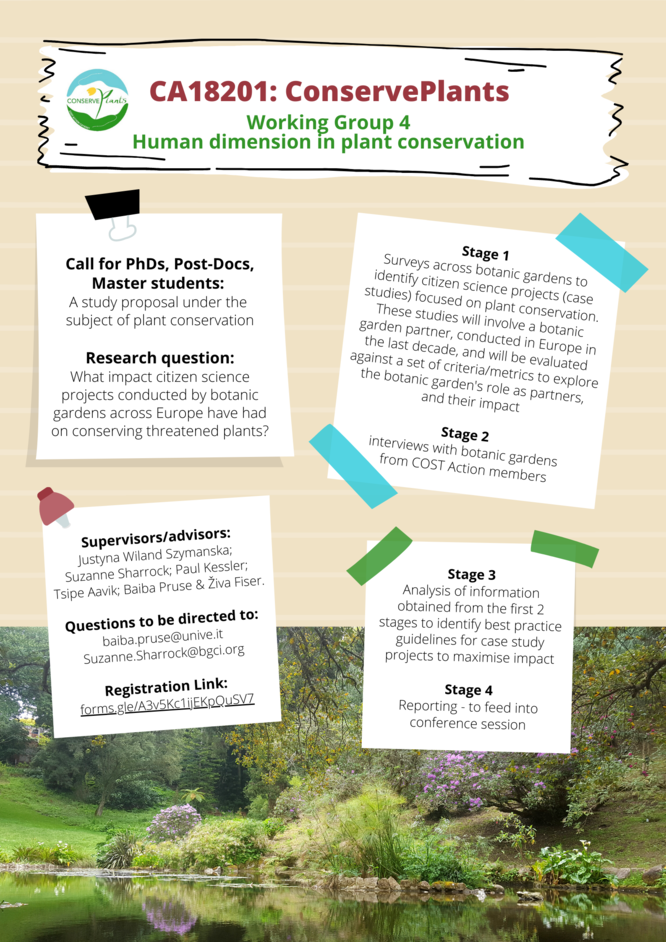
14th April 21: WG4 Meeting with all WG4 members
Time: 03:30 PM Rome
Meeting link: please, reach out to Baiba Pruse (baiba.pruse@unive.it) or Justyna Wiland-Szymańska (wiland@amu.edu.pl) to receive the zoom link.
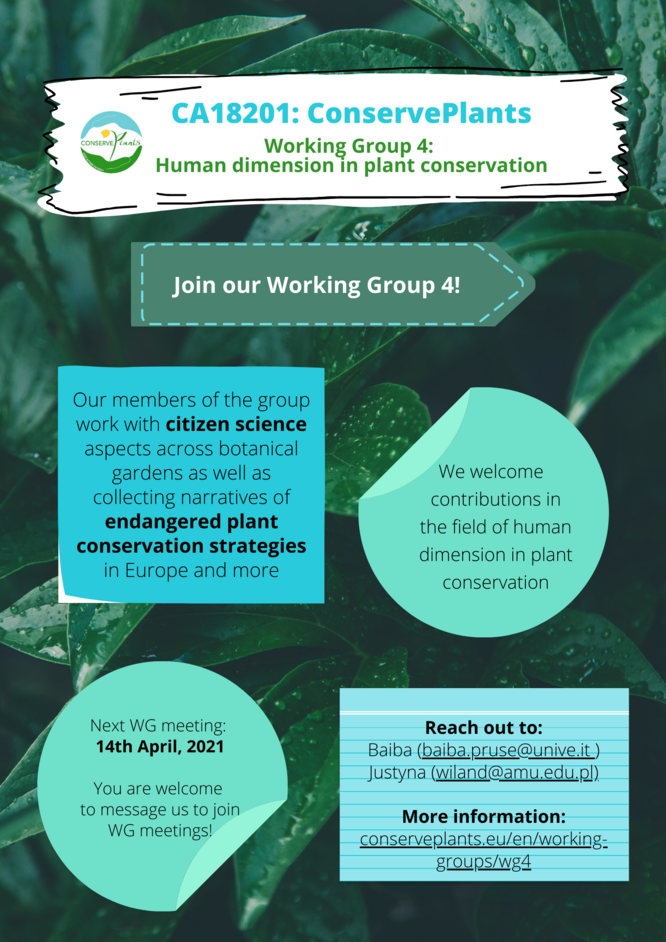
24-25th Feb 2021: Plant Food-Medicines: Perceptions, Traditional Uses and Health Benefits of Food Botanicals, Mushrooms, and Herbal Teas
On behalf of Prof. Renata Sõukand and Prof. Andrea Pieroni, the ERC-StG-2016 DiGe team and members of COST Action ConservePlants Working Group 4 (CA18201) we welcome each and every one to join TWO DAY WORKSHOP on Special Issue “Plant Food-Medicines: Perceptions, Traditional Uses and Health Benefits of Food Botanicals, Mushrooms, and Herbal Teas” on 24th (10:30 - 12:30 CET) and 25th (10:30 - 17:00 CET) of February.
More info available here.
Please, register and provide your research interest based on the workshop information here: https://forms.gle/pMaFwmibnwZK94Gy8 until 10th of February (2021) in order to receive the entrance link before the workshop and additional instructions.
For any questions please, come back to:
Cristina Flora [857854@stud.unive.it] or Baiba Pruse [baiba.pruse@unive.it].
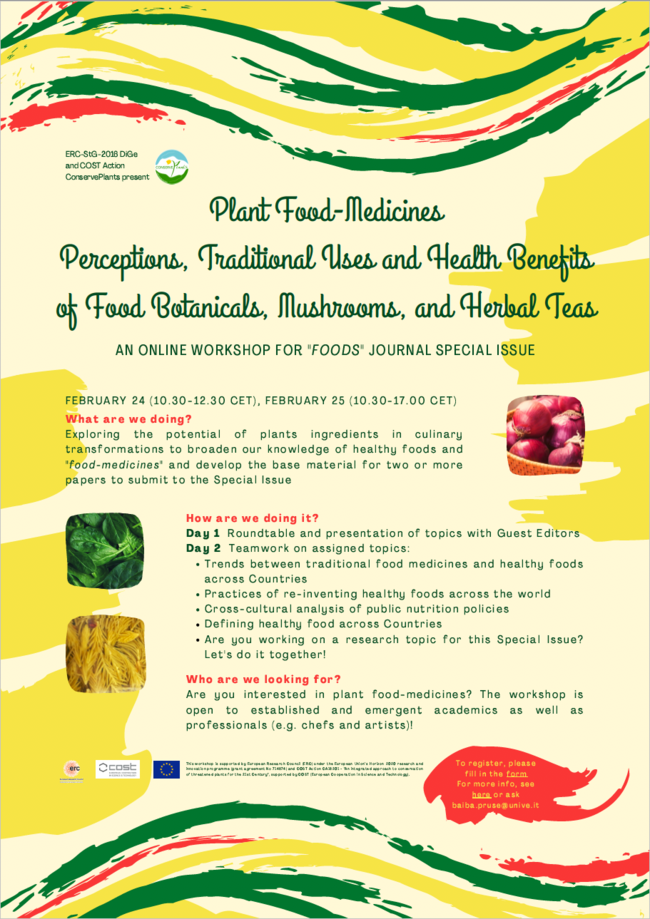
MC Meeting and WG meetings, 18-20th November 2020 - ON-LINE
The 3rd MC Meeting of ConservePlants will be held on 18th November. WG meetings will follow between 18-20th November. All meetings will be held on-line. In spite of the current situation with Covid, ConservePlants members are being active and Working Groups are continuing with the planned activities.
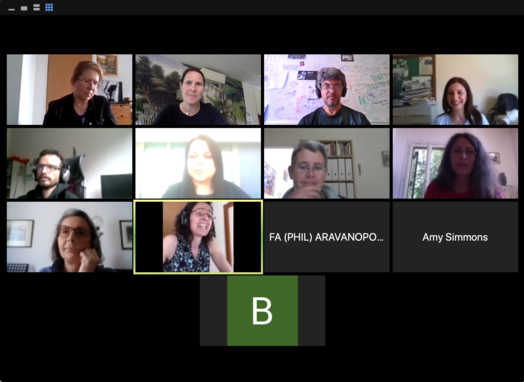
ConservePlants in BGjournal
BGjournal is the worldwide journal of botanic garden conservation. It covers a range of detailed content including in-depth features, congress reports, profiles of gardens and case studies of conservation work being carried out in gardens around the world.
Among the featured articles in the recent issue of BGjournal - Working towards the achievement of the GSPC Targets - is an article about ConservePlants!
Find the latest issues of the BGjournal here
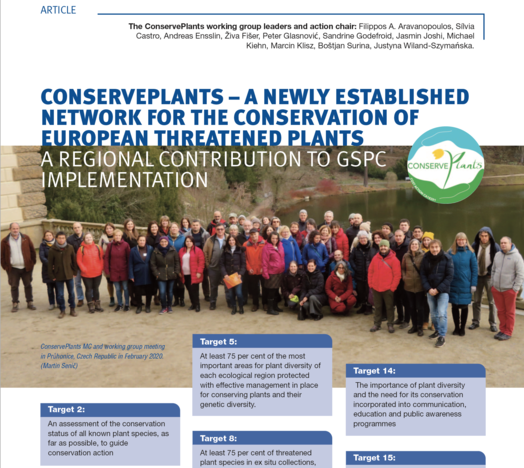
Management Committee and Working Group meeting in Průhonice, 5-6 February 2020
We are excited to inform you that the Institute of Botany of the Czech Academy of Sciences will be hosting the next Management Committee and Working Group Meeting of our COST Action. Botanists from almost 40 coutries will meet in the beautiful Castle of the Průhonice Park!
Moreover, 2 guest speakers will join us on the 5th February:
Professor Vernon Heywood, a specialist in plant taxonomy and systematics, is Emeritus Professor in the University of Reading. He has worked on biodiversity and conservation issues in many parts of the world, particularly in the Mediterranean. He will give a lecture with the title: "The challenges of integrated plant conservation in Europe".
Dr. Zuzana Münzbergová is a plant ecologist interested in mechanisms driving dynamics of natural populations. She will present the "Genetic diversity in populations of rare species and its implications for species conservation". At the moment she is the head of the Department of Population Ecology at the Insitute of Botany of the Czech Academy of Sciences.
